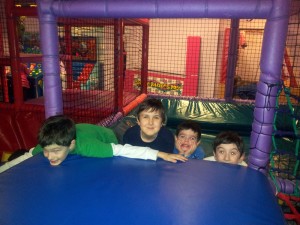My son, Cameron, has never done well with leaving something unfinished… it’s especially evident when it comes to video games. It’s for this reason that we try to steer him away from games that can take weeks or months to finish. Certain Mario games consisting of 8 worlds comes to mind.
Asking him to stop in the middle of playing a game, painting a picture, playing with his toys, trying to read, watching a movie… just about any of these things can cause him to have a complete meltdown.
Sometimes it’s not even something that he particularly enjoys… but if his mind is focused on it, he will not cope well with having to leave it before he has a chance to finish what he started.
It’s not always a complete meltdown… sometimes it’s a mood switch. Where he’s been doing great all day, gets interrupted this one time and then, for the rest of the day, he’s moody, grumpy or just plain… not himself.
These are the methods we’ve used to avoid this from happening.
 Make sure it ends
Make sure it ends
Simple enough right? But this is the best method, obviously, that we’ve found to ensure that there is no issue.
This means that art projects are short, or at least, will never take longer than the time allotted. Movies are played through to completion and that video games are only about an hour long.
The Mario Party games are perfect for this, or racing games. He can start and finish a game in about an hour.
Structure and/or Repetition
One good method is to simply know what to expect each day. This is especially effective at school… when one class ends and another begins, he knows that his time is up even if he’s not done.
It doesn’t affect him as much because it’s how it always is. The same thing, every time.
It’s a bit like my next point, except without having to know how long minutes or hours are.
5 minute warnings
This one varies, since it doesn’t always have to be 5 minutes but essentially, we tell Cameron that his time is almost up, to finish what he’s doing and to get ready to do something else.
This gives him the time to wrap up and put what ever finishing touches he needs on something to help him walk away from it without having a meltdown.
It doesn’t always work out perfectly and he’ll either need a little extra time or we’ll just have to deal with the meltdown but for the most part, this helps him get ready for what’s coming.
Timer
Most children have no idea how long 5 minutes is… which is largely due to our own inconsistencies. Since we’re often doing things ourselves, 5 minutes can sometimes be 6, 8, 10… sometimes even 15 minutes. This can be very confusing and frustrating sometimes.
Cameron does really well now, not really caring just how long 5 minutes is… but at first we had to be pretty rigid.
We’d do this with a timer… having a smart phone with a timer on it is very handy.
When he heard the timer ring, he knew that his time was up. It would sometimes still be a problem since he might not feel he is finished though… again, sometimes having to spare a few more minutes or deal with the meltdown.
Does it ever get better?
Well, Cameron is only 6 so I can’t say for certain if he’ll ever be able to cope well with it… everyone is different after all.
But so far, it’s very encouraging because he copes a whole lot better than he did when he was younger. Which of course, is very much reflective of age just as much as autism. Children in general don’t handle that sort of thing well.
We still have meltdowns to deal with sometimes, particularly if it’s something he really enjoys like a video game or a new movie… but it’s far less frequent now than it was in the past.
We don’t need to use timers anymore since “5 minutes” is generally good enough for him to know that he needs to start finishing up.
Personally, I don’t like having to leave work while I’m in the middle of something I really want/need to get finished. I don’t have a meltdown by any means but it’s hard on me. So I’d imagine, if my son is anything like me, he’ll never fully get over it either.
But he is doing great and has come so far already so I am confident that he’ll manage just fine with dealing with things like that in the future.













